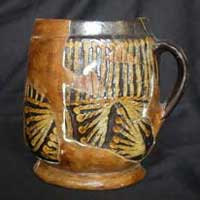 |
 |
 |
 |
 |
 |
 |
|
|
Food and Drink The lay-brothers who worked and lived on the granges received more generous portions than those staying at the abbey, and according to the twelfth-century customs for the lay-brothers (Usus Conversorum), they might receive an additional loaf of coarse bread. In addition, they were not expected to observe as many fasts as the monks.(35) Unlike their fellow brethren who worked at the monasteries, the lay-brothers at the granges did not enjoy ale or wine with their meals. This was forbidden on the granges, in case it led to drunkenness which could result in frivolity, fisticuffs or even fatalities. Not surprisingly, this prohibition fuelled considerable discontent and sparked off several revolts. The lay-brothers of Meaux Abbey in Yorkshire, were so outraged by this ban that they attacked their abbot and cellarer, whom they pulled from his horse. The angry mob then pursued the two officials for several miles.(36)
The lay-brothers gathered in the refectory at the grange for dinner and also supper, if this was served. Neither the shepherds nor the herdsmen returned for meals, but brought their food with them to eat in the pastures at the appropriate time. The shepherds were expected to return any leftover bread and were strictly prohibited from accepting gifts of food, although they could, should they wish, eat any berries or nuts that they found.(37) The herdsmen of Clairvaux, and no doubt those attached to other abbeys, received a more substantial food allowance, on account of their hard labour and were permitted a cooked dish to supplement the portion of bread.(38)
|
